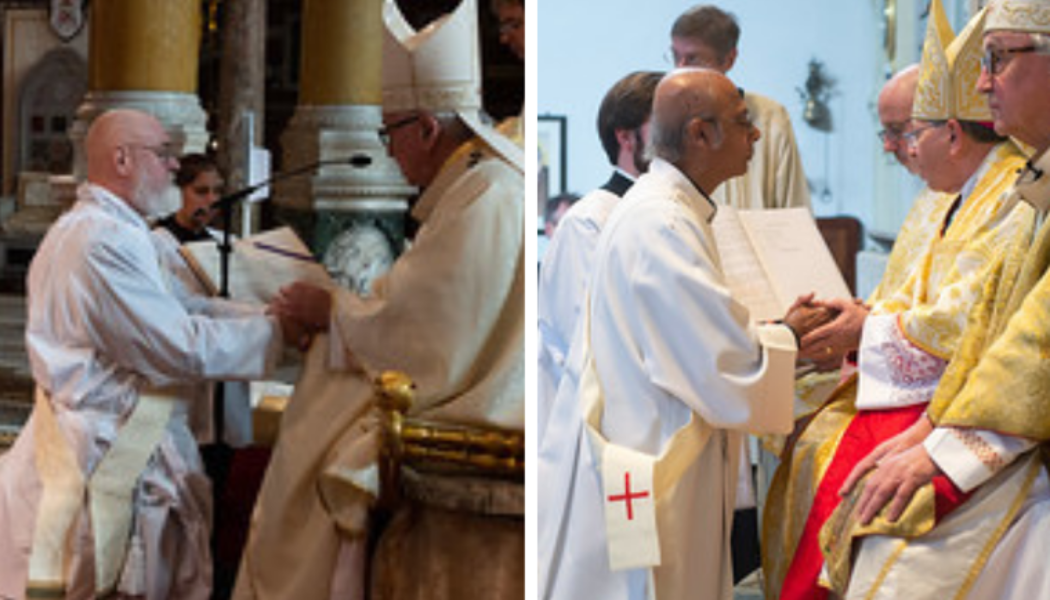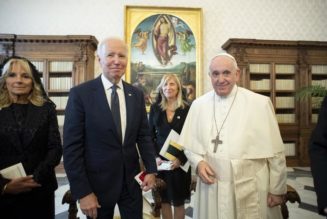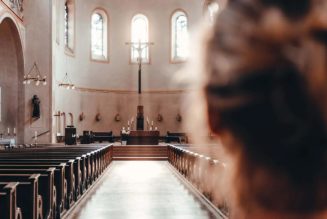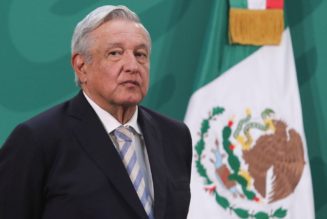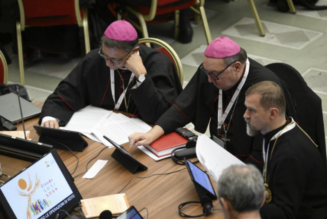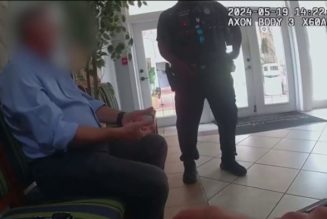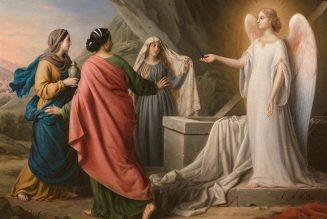
LONDON — Six months ago, Jonathan Goodall lay down his ministry as the Anglican bishop of Ebbsfleet, England, in order to enter into the Catholic Church.
This past Saturday, now-Father Goodall was ordained to the Catholic priesthood in Westminster Cathedral by Cardinal Vincent Nichols — the culmination of a journey from Protestantism to the Catholic Church taken recently by a number of former Anglican bishops.
“It’s quite a journey,” Cardinal Nichols said in his homily about Father Goodall’s path to the priesthood. “Yet, I know that it is driven by one sole quest, the desire for that one necessary thing: to live in conformity to the will of God.”
The next part of Father Goodall’s journey will be as a parish priest for St. William of York in London, part of the Archdiocese of Westminster. Cardinal Nichols made clear the Church’s position in his homily that Father Goodall’s service as an Anglican bishop truly engendered God’s grace in others and is “now incorporated into the fullness of the priesthood as understood and lived in the Catholic Church.”
In little more than a year, four former Church of England bishops have come into full communion with the Catholic Church, either through the ordinary Roman Catholic diocese or through the Ordinariate of Our Lady of Walsingham, a Catholic diocese with Anglican traditions for the United Kingdom established under Pope Benedict XVI’s 2009 apostolic constitution Anglicanorum Coetibus.
Besides Bishop Goodall, three retired Church of England bishops came into full communion with the Catholic Church in 2021: Father Michael Nazir-Ali, the former bishop of Rochester; Peter Foster, the former Bishop of Chester; and John Goddard, former Bishop of Burnley. Father Nazir-Ali, who was almost chosen as the archbishop of Canterbury, was ordained to the Catholic priesthood Oct. 30 by Cardinal Nichols in London for the ordinariate. Goddard is set to be ordained to the Catholic priesthood for the Archdiocese of Liverpool on April 2, while Foster has not indicated if he wants to remain a layman or pursue the priesthood.
Faithful Discipleship
While Anglican bishops will have varied reasons for becoming Catholic, Father Nazir-Ali explained the central question behind these decisions is “how to remain a faithful disciple.”
“I need — and I think most Christians would need — some clarity about how to be a disciple in today’s fast changing world,” Father Nazir-Ali told the Register about his decision to join the Catholic Church.
Father Nazir-Ali said he was part of the ARCIC (Anglican-Roman Catholic International Commission) dialogues between the Anglican Communion and the Catholic Church. The dialogues were originally meant to fulfill an “explicit mandate” from Pope St. Paul VI and then-Archbishop of Canterbury Michael Ramsey to seek a path for restoration of full sacramental communion between the churches — a prospect that Father Nazir-Ali said “now seems, well, humanly speaking, impossible.”
“That is, of course, one of the reasons why people are now giving up on that unity-by-stages idea,” he said.
Father Nazir-Ali said the Anglican Communion seemed to have lost “a kind of impetus towards recovery of catholicity,” and instead seems “now set on a course of just being another liberal Protestant denomination.”
“So many of us who believe that we were getting the faith of the Fathers and the Councils by being Anglican are now finding that that is no longer the case,” he said.
Father Nazir-Ali concluded Anglicanism has no way of making “Gospel-based decisions about the way the faithful should live and witness” apply to every part of the Anglican Communion. Additionally, he said, Anglicans have “no agreed body of teaching to which appeal can be made,” and they lack a “competent teaching authority that can declare and clarify and confirm the faith of the Church in respect of questions that arise in the life of the faithful.”
“So that means that there is a contradiction and disagreement about fundamental issues,” he said.
Father Nazir-Ali said the unilateral actions of the Anglican Communion have validated the objections from the Catholic Church and the Orthodox Churches that “Anglicans can’t claim to share the apostolic ministry with them, and then change it in such a significant way without overwhelming ecumenical consensus about it.”
Father Nazir-Ali said he joined the ordinariate in becoming Catholic because he did not want to leave behind what was true, good and beautiful in the Anglican tradition.
“I was very encouraged to see how much of Anglican patrimony could actually be used in good faith by the Catholic Church,” he said. “I think that is a very significant ecumenical development.”
More Clergy on the Way
More Anglican clergy are concluding the path forward lies in the Catholic Church. Father Paul Martin, who runs the St. Barnabas Society, a U.K. charity that supports Anglican clergy making the journey into full communion, told the Register the canonization of St. John Henry Newman in 2019, followed by the COVID-19 pandemic, “focused the minds of still more who had considered converting.”
“At the St. Barnabas Society, we saw a significant increase in the number of those approaching us for help,” he said in an email. “Many of them were unhappy with the way the Church of England had handled the pandemic and spoke of what they perceived to be the marginalization of Catholic-minded Anglican clergy.”
Father Nazir-Ali said he has already been “approached by other groups of Anglicans who want to use me as a bridge to talking with the Catholic Church.”
“And I will, of course, when that happens, facilitate that conversation,” he added.
The splintering of the Anglican Communion over the division of doctrine has seen Anglicans attempt to forge new Anglican jurisdictions instead of just coming into full communion with the Catholic Church. But Gavin Ashenden, a former Church of England priest who became a missionary bishop for a “Continuing Anglican” jurisdiction, told the Register that he became Catholic in December 2019 after he realized the “Continuing Anglican” movement could not “reconfigure a renewed Catholic Anglicanism.”
“My great discovery as a ‘Continuing’ bishop was that without the magisterium, that was completely and utterly impossible,” he said, explaining that getting pragmatic unity, let alone doctrinal consensus, among Continuing Anglicans proved impossible.
“Every generation needs a settled mind of the Church to weigh the merits and demerits of whatever society throws up,” he said.
Ashenden entered the Catholic Church via his local Latin Rite diocese, but later transferred to the ordinariate after recognizing the importance of the Anglican Prayer Book tradition in his spirituality. He is awaiting a decision from Rome on his application to become a Catholic priest.
Ashenden said Anglicanism from the start had been a “collaboration of a number of different theological traditions.” But while they could agree on baptism and the role of the laity, this continued collaboration could not define what they believe about “the most important elements of Christianity, the nature of the Church, the nature of the Eucharist.”
“None of this had been done theologically in Anglicanism,” he said. “And that’s another reason why it has fallen so quickly prey to the very clearly focused and highly energized, pseudo-ethical energy of progressive politics.”
Ashenden added, “The game-changer was third-wave feminism,” which “made subjectivity absolute” in the Anglican world. He said the General Synods within Anglicanism, rather than theologically exploring and defining the nature of the priesthood first, ended up voting to approve the ordination of women to the priesthood akin to a political process.
Unity Christ Prayed For
Msgr. Keith Newton, the ordinary for the Our Lady of Walsingham Ordinariate, told the Register that he left his ministry as the Anglican bishop of Richborough and came into the Catholic Church in 2010 with the creation of the ordinariate. As a young Anglican priest, a pilgrimage to Rome had convinced him of the urgency of realizing Jesus Christ’s prayer to the Father for the unity of the Church.
“I was so overtaken with this experience that I really thought the Church of England needs to get back in communion with the Church from which it came,” he said.
However, Msgr. Newton watched with dismay as the Churches drifted further apart even as the ARCIC agreements came together. When Benedict XVI created the ordinariates with Anglicanorum Coetibus, he said, “the apostolic constitution was an answer to my prayer for unity.”
Today, he said, ecumenism seems to be going through a “rough patch.”
While the Catholic Church set its sights on achieving ecumenical unity at the Second Vatican Council more than 50 years ago, today the sights for ecumenism are being lowered from corporate communion. Instead of discussing how the Catholic Church can successfully integrate in its life a Reformation tradition with the stability of Catholic doctrine, a possibility demonstrated by the ordinariates, Msgr. Newton explained the official dialogue has seen a reluctance to discuss difficult questions resulting in a kind of “ecumenism of niceness.”
“It’s better to be nice to each other as Christians than being nasty to each other,” he said. “But that strikes me to be not what Jesus prayed for … he prayed that we’d be one.”
Ashenden said he hoped the recent entrance of Anglican bishops into the Catholic Church — along with 10% of Catholic priests in the U.K. being former Anglican clergy — would lead to bolder invitations for Anglicans to come into full communion.
“I think the Catholic Church should develop a sense of confidence in England and say, ‘If you want Christianity to continue, we’re it and what’s more, we’re all you’ve got,” he said. “So come over and come quickly.”
Join Our Telegram Group : Salvation & Prosperity
